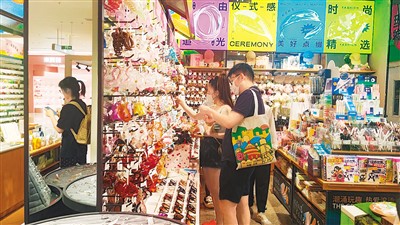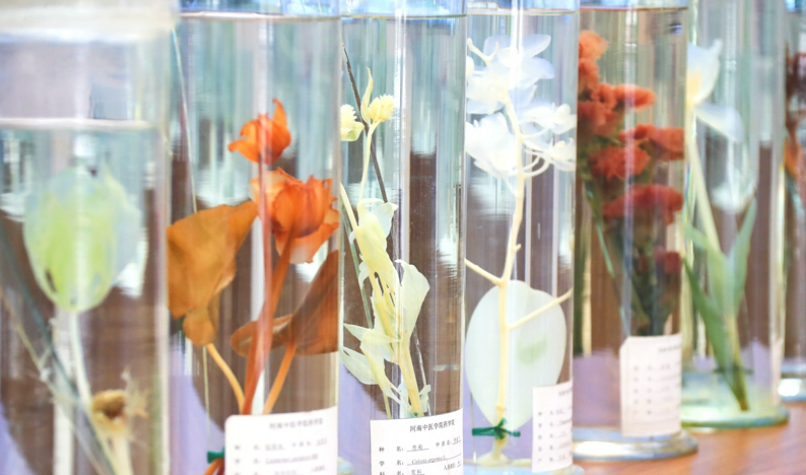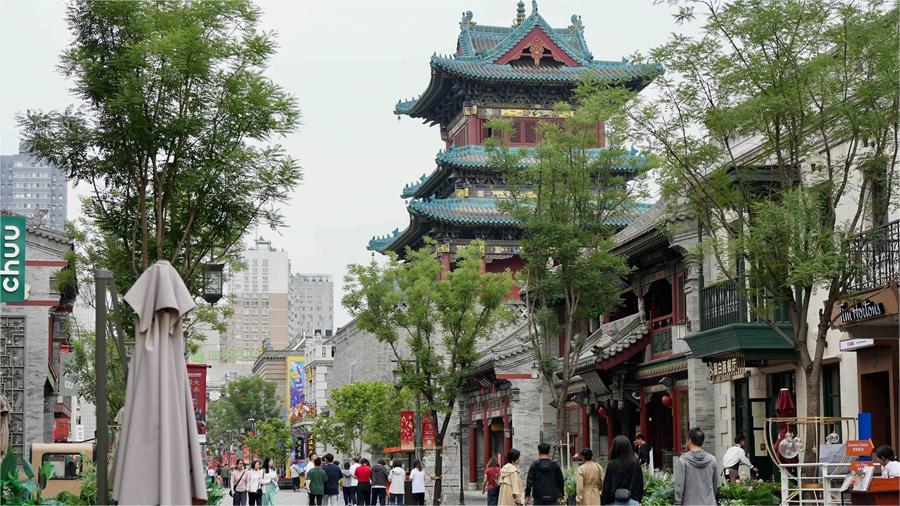Pursuit of emotional value spurs new consumption scenarios

Consumers buy products with emotional value at a shopping mall in Beijing. (Photo/Sun Yichun)
Consumer goods have expanded beyond the realm of material possessions and encompass the realm of spirituality. Consumer attitudes have shifted from valuing functionality to seeking enjoyment and therapeutic benefits.
"I ordered a bottle of 'good luck spray' before my final exams and sprayed it on myself and my three roommates before entering the exam room," said a university student in Beijing surnamed Zhao.
According to Zhao, people born in the 2000s are particularly fond of "good luck sprays." Although they know it's just a regular fabric freshener, spraying it on gives them a sense of good luck and boosts their confidence.
Some people derive emotional value from buying virtual goods. Some people seek companionship and a listening ear online, while others seek solace through offline activities.
Who foots the bill for emotional consumption?
According to a report by McKinsey & Company on China's consumer trends in 2024, 64 percent of consumers prioritize spiritual consumption. This trend is particularly pronounced among younger generations.
Shop owners on Alibaba's e-commerce platform Taobao have noticed that it is mainly young people who are more inclined to invest in products that create emotional value.
Jiang Nan, a Taobao shop owner offering "wake-up calls for love-struck minds," said that the majority of people seeking these services are between the ages of 18 and 28. This particular age group often encounters numerous choices and pressures related to education, career, and relationships.
Why are many young people willing to purchase products that create emotional value?
"I frequently cover the costs of emotional consumption, whether it involves purchasing tangible items like aromatherapy or companionship services," said Xiao Bai.
Due to the considerable stress associated with work, Xiao Bai, 32 years old with nine years of work experience, actively seeks a sense of ritual or an avenue for emotional relief through consumption.
"I spent almost 1,000 yuan ($138) to improve my workspace, and it has significantly enhanced my daily work experience," said a resident of Shanghai surnamed Liu.
She upgraded her workspace by adding a colorful mechanical keyboard, buying a beautiful pot for her plant, personalizing a desk mat, and displaying her cherished ornaments.
"Being surrounded by items that I like, my mood is elevated every day. Through the power of emotional consumption, I have discovered joy in the little things," she said.
Seeking comfort and encouragement also serves as a driving force for young people to make purchases.
A woman surnamed Yang, who hails from east China's Anhui Province and currently lives in Beijing, frequently orders "tree-hole listening" services.
"I don't want to be a burden on my family, and I don't have any friends who can empathize with what I'm going through. I need a 'safe space' to vent my negative emotions, and I long for someone to lift my spirits," said Yang.
According to a report on China's modern consumption development index in 2023, there has been a significant rise in the number of consumers prioritizing self-satisfaction, reaching 47.8 percent. This marks a growth of 16.8 percent compared to 2022.
This shift reflects the changing consumption preferences of the new generation, who no longer prioritize product functionality alone. They now value the sense of satisfaction and engagement, as well as the ceremonial aspects of consumption.
As living standards improve, Chinese consumers' purchasing power grows rapidly, according to Yi Shaohua, director of the Market Circulation and Consumption Research Office at the National Academy of Economic Strategy, Chinese Academy of Social Sciences.
Consumers are now transitioning from prioritizing the availability to assessing the quality of products or services.
The act of purchasing goods and services has evolved beyond their utilitarian value to include their spiritual value. The added value derived from the pleasure, emotional relief, and other emotional benefits obtained through these purchases have become a significant factor in consumer behavior.
Records show that the domestic perfume and fragrance industry has been growing at an average annual rate of over 20 percent in recent years.
Why do consumers like to buy perfume?
According to figures from data provider iResearch, a survey conducted in 2022 revealed that 74.4 percent of respondents believed that perfume has the power to provide pleasure and emotional healing, ranking it as the top choice among all options.
Furthermore, patent data from Tianyancha, a database query platform, indicates that there are over 3,500 patents related to emotions in the market. This suggests that companies are increasingly prioritizing the exploration of emotional value.
Photos
Related Stories
- China’s summer consumption booms, as strong momentum expected to remain a major economic booster: experts
- 618 shopping festival kicks off, boosting consumption recovery
- Consumer electronics sales looking up
- Used luxury goods hot online
- Outbound travel boom mirrors China's consumption vibrancy
- Chinese Numbers: Highlights of China's May Day holiday tell consumption vitality
- Chongqing ushers in new low-altitude consumption scenarios
- Chinese cities gear up to boost consumption during May Day holidays, further accelerating economic recovery
Copyright © 2024 People's Daily Online. All Rights Reserved.









